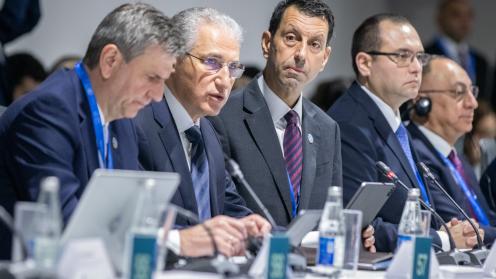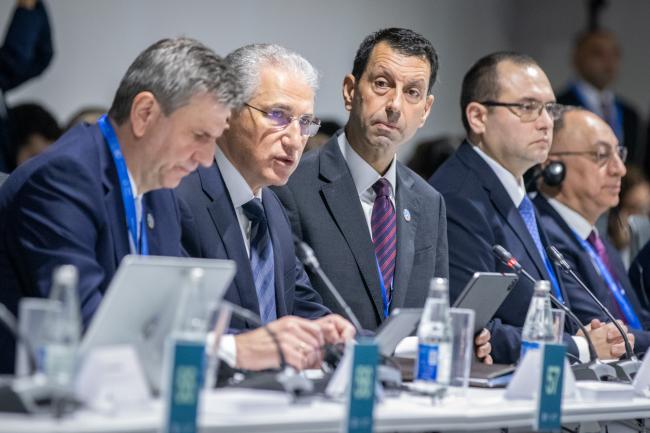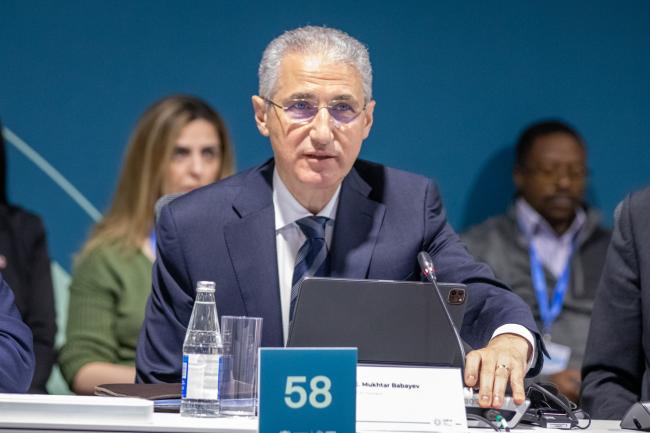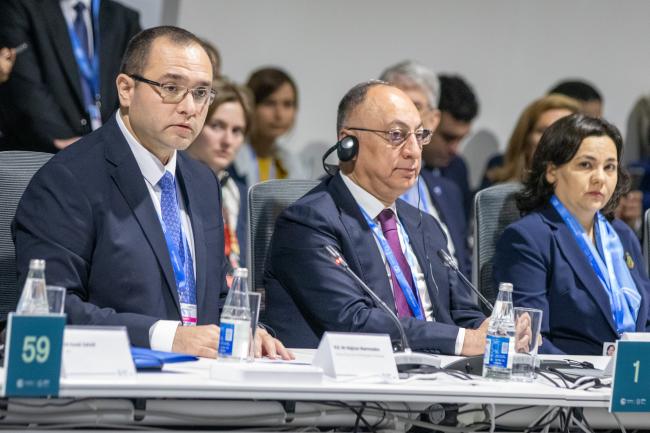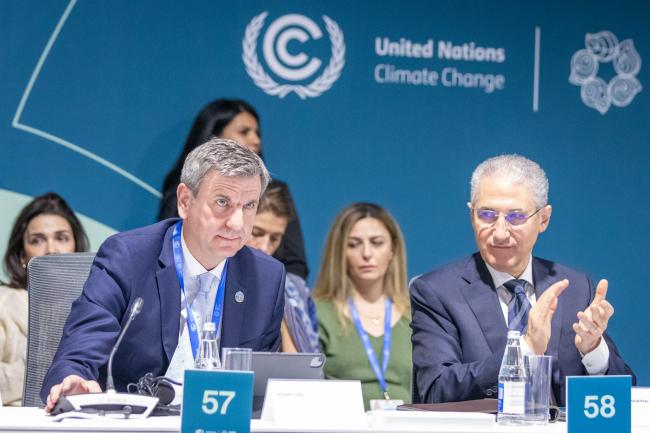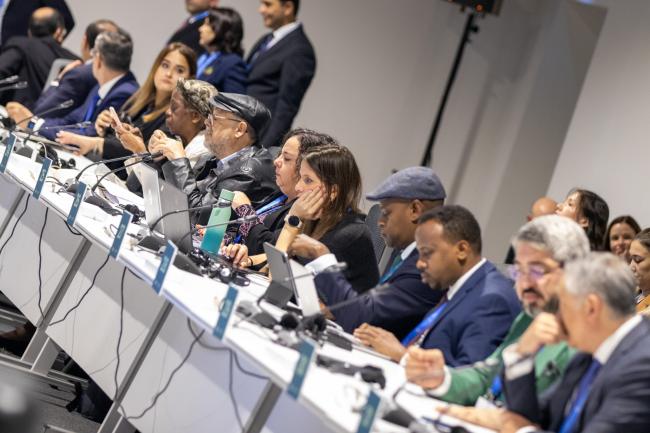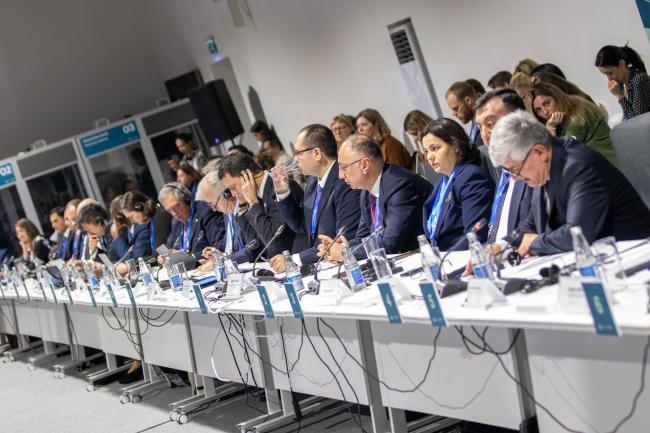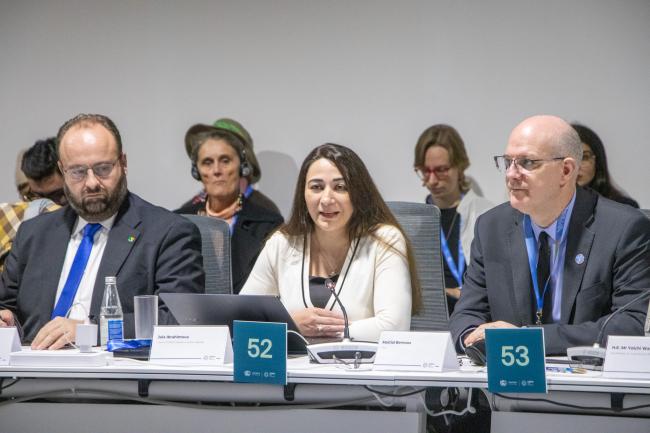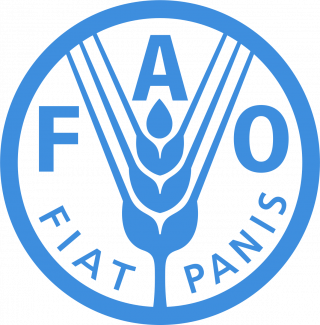About
The relevance of agrifood systems for climate action is experiencing a growing momentum, with COP 27 and COP 28 Presidencies launching, respectively, the Fast Partnership and the UAE Declaration on Sustainable Agriculture. The Harmoniya Climate Initiative represents COP 29’s contribution, with a focus on fostering better collaboration among actors and initiatives.
Addressing climate change through adaptation and mitigation in agriculture presents a unique opportunity to confront critical global challenges, such as food insecurity, land degradation, and water scarcity. These efforts not only safeguard farmers' livelihoods but also contribute significantly to the realization of the Sustainable Development Goals. This growing urgency has sparked heightened global attention on the interconnectedness of agriculture, food systems, and water resources—a nexus emphasized by the last two COP Presidencies, as evidenced by initiatives such as COP 27’s Food and Agriculture for Sustainable Transformation (FAST) Partnership and the COP 28 UAE Declaration on Sustainable Agriculture, Resilient Food Systems, and Climate Action.
Opening Food, Agriculture and Water Day at COP 29, this event served as the launch of the COP 29 Presidency’s Baku Harmoniya Climate Initiative for Farmers (Harmoniya Initiative), in collaboration with the Food and Agriculture Organization of the UN (FAO). The event was moderated by Kaveh Zahedi, Director, Office of Climate Change, Biodiversity and Environment, FAO.
In scene-setting remarks, Mukhtar Babayev, COP 29 President, stressed the importance of the agrifood sector for Azerbaijan, which employs 36% of its workforce. The Harmoniya Initiative, he explained, seeks to build on past efforts to accelerate the transformation of agriculture and food systems, such as COP 27's FAST Partnership and COP 28’s UAE Declaration. Its mission, he said, is to unify diverse initiatives into a shared vision with three core goals: fostering collaboration among initiatives through a knowledge-sharing platform; making agrifood investment more attractive to Multilateral Development Banks and Agricultural Public Development Banks; and empowering farmers—especially women and youth—with tools to build climate-resilient communities. Noting agriculture is both vulnerable to and a solution for climate change, he concluded by emphasizing that “today’s event is more than a launch; it is a call to action.”
Majnun Mammadov, Minister of Agriculture, Azerbaijan, emphasized that those on the frontlines of the agriculture sector—namely, farmers—are often the most vulnerable to climate change impacts like water scarcity. These individuals, he stressed, often feel the impacts of climate change first but are often the last to receive support. He lauded the Harmoniya Initiative, which seeks to change this by piecing together the fragmented landscape of existing initiatives and mobilizing investments for sustainable agriculture. He called for greater global cooperation to build climate-resilient rural communities to better ensure harmony between “people, nature, and society.”
Viorel Gutu, Assistant Director-General and Regional Representative for Europe and Central Asia, FAO, emphasized the links between climate change, food security, and agrifood systems. Highlighting a decade of growing momentum and initiatives on this theme, including the COP 28 UAE Declaration’s endorsement by 160 countries, he praised the Harmoniya Initiative for prioritizing both coordination and inclusion. Gutu also underscored the need for increased climate financing for agrifood systems, noting its share has declined from 37% to 27% over the last two decades, as per FAO’s Climate-related development finance to agrifood systems, 2024 update.
İlhama Gadimova, Deputy Minister for Agriculture, Azerbaijan, lauded the launch of the Harmoniya Initiative, stating that it fosters much-needed international collaboration in the agricultural sector. Describing farmers’ previous predicament as “finding a needle in a haystack” when it comes to climate solutions, she noted that the Harmoniya Initiative provides clarity on agricultural initiatives and makes the sector attractive to investors. She shared Azerbaijan’s work in the sector, which includes: improving access to real-time data and community resources; providing farmers with the tools to become "problem-solvers"; and developing a platform for farmers to learn from best practices.
Shobha Shetty, Global Director, Agriculture and Food Global Practice, World Bank, called for increasing investments in the food and agriculture sector given that less than 5% of private finance is allocated to this sector. She stated that the World Bank will share its expertise and knowledge to support the Harmoniya Initiative and double its commitment to financing for the agricultural sector to USD 9 billion annually by 2030.
Jemimah Njuki, Chief, Economic Empowerment, UN Women, emphasized the critical role of women in agriculture and in the fight against climate change. However, she lamented their persistent exclusion from financial and other benefits, citing constraints in accessing markets, technology, and finance, as well as being disproportionately affected by food insecurity and unpaid care work. She praised the Harmoniya Initiative for its potential to empower women farmers, and for recognizing investment in women as key to sustainable food systems and climate resilience.
Highlighting the essential role of farmer-led solutions in addressing agrifood challenges, Andrea Porro, Secretary General, World Farmers Organization, stressed the importance of placing farmers at the center of the agrifood system transformation. He called for adopting approaches that recognize the plurality of systems in the agrifood sector, which includes the transport, energy, and consumer sectors, among others. He warned that missing the opportunity to unite around farmer-driven solutions would hinder transformative progress.
Martial Bernoux, FAO, shared the results of the mapping exercise conducted by the FAST Partnership, which showed the need for synergies in the agricultural sector and highlighted the growing interest by countries to collaborate under the Harmoniya Initiative.
Fernando Mattos Costa, Minister of Livestock, Agriculture, and Fisheries, Uruguay, shared Uruguay’s strategy for the food and agriculture sector in its Nationally Determined Contribution (NDC). He said this includes: enhancing the conditions of vulnerable groups engaged in food production; identifying mitigation and adaptation actions to take; and leveraging the country’s public assets to attract more investment in this sector.
Claudia Müller, Parliamentary State Secretary, Federal Ministry of Food and Agriculture, Germany, emphasized Germany’s support of the Harmoniya Initiative and FAST Partnership. Pointing to the necessity of including agriculture and food systems in climate discussions, she encouraged integrating data, giving farmers access to this information, and learning from each other to ensure food security.
Paul Gulleik Larsen, Ministry of Foreign Affairs, Norway, announced Norway’s contribution of more than NOK 5 billion to the World Bank’s International Development Association (IDA), part of which focuses on supporting adaptation and food security in the most vulnerable countries. Noting the need to address challenges in the food and agriculture sector, he shared Norway’s participation in the Alliance of Champions for Food Systems Transformation, which seeks to strengthen food systems transformation pathways.
Prosper Dodiko, Burundi’s Minister of Environment, Agriculture, and Livestock, highlighted Burundi’s commitment to the Initiative. He noted his country has introduced innovations like watershed development, combating soil degradation, and youth and women-focused programmes. He emphasized that the Harmoniya Initiative will unite diverse initiatives, providing a framework to adapt and replicate successful models locally.
Asozoda Nurali Mahmadullo, First Deputy Minister of Agriculture, Tajikistan, highlighted the escalating impacts of climate change on agrifood systems, including rising temperatures, altered precipitation patterns, and reduced water availability, all of which threaten rural livelihoods and global food security. He called attention to Tajikistan’s efforts to adapt through climate-smart agriculture, social entrepreneurship, digital solutions, and training for women farmers.
Makoto Sakashita, Director of Global Environment Office, Ministry of Agriculture, Forestry and Fisheries (MAFF), Japan, on behalf of Yoichi Watanabe, Vice-Minister for International Affairs, MAFF, emphasized the urgency of enhancing sustainability in agriculture amid rising climate impacts. He highlighted Japan's climate-smart innovations, the recent revision of its Basic Law on Food, Agriculture and Rural Areas, which seeks to prioritize food security amid global instability, and its contributions to the FAST Initiative.
Gulbaniz Ganbarova, Chairperson, Azerbaijan Rural Women’s Association, welcomed the resolution, adopted by the UN General Assembly, that declares 2026 as the International Year of Women Farmers. She highlighted women’s vital role in producing half of the world’s food and ensuring food security, yet lamented they remain excluded from decision-making processes. She called for national and international platforms to amplify women farmers’ voices and, ensure they become active decision makers.
In concluding remarks, Zahedi stressed that the aspirations expressed at the event “must and will continue beyond this session.”
Jala Ibrahimova, Co-Lead, COP29 Action Agenda, emphasized agriculture’s dual role as a significant greenhouse gas emitter and a vulnerable sector facing escalating climate impacts like droughts and shortages, as well as its transformative potential for climate action and long-term sustainability.
Organizers: FAO, COP 29 Presidency
Contacts: Jala Ibrahimova, COP 29 Presidency I Jala.ibrahimova@cop29.az; Imelda Bacudo, FAO I Imelda.Bacudo@fao.org; Martial Bernoux, FAO I Martial.Bernoux@fao.org
Website: https://www.fao.org/climate-change/fao-at-cop29/Food-Agriculture-and-Water-Day/en
To receive free coverage of global environmental events delivered to your inbox, subscribe to the ENB Update newsletter.
All ENB photos are free to use with attribution. For this side event, please use: Photo by IISD/ENB | Matthew TenBruggencate
Select Images

Yoichi Watanabe, Vice-Minister for International Affairs, Ministry of Agriculture, Forestry and Fisheries, Japan

Claudia Müller, Federal Ministry of Food and Agriculture, Germany; Fernando Mattos Costa, Minister of Livestock, Agriculture, and Fisheries, Uruguay; and Viorel Gutu, FAO Assistant Director-General and Regional Representative for Europe and Central Asia
